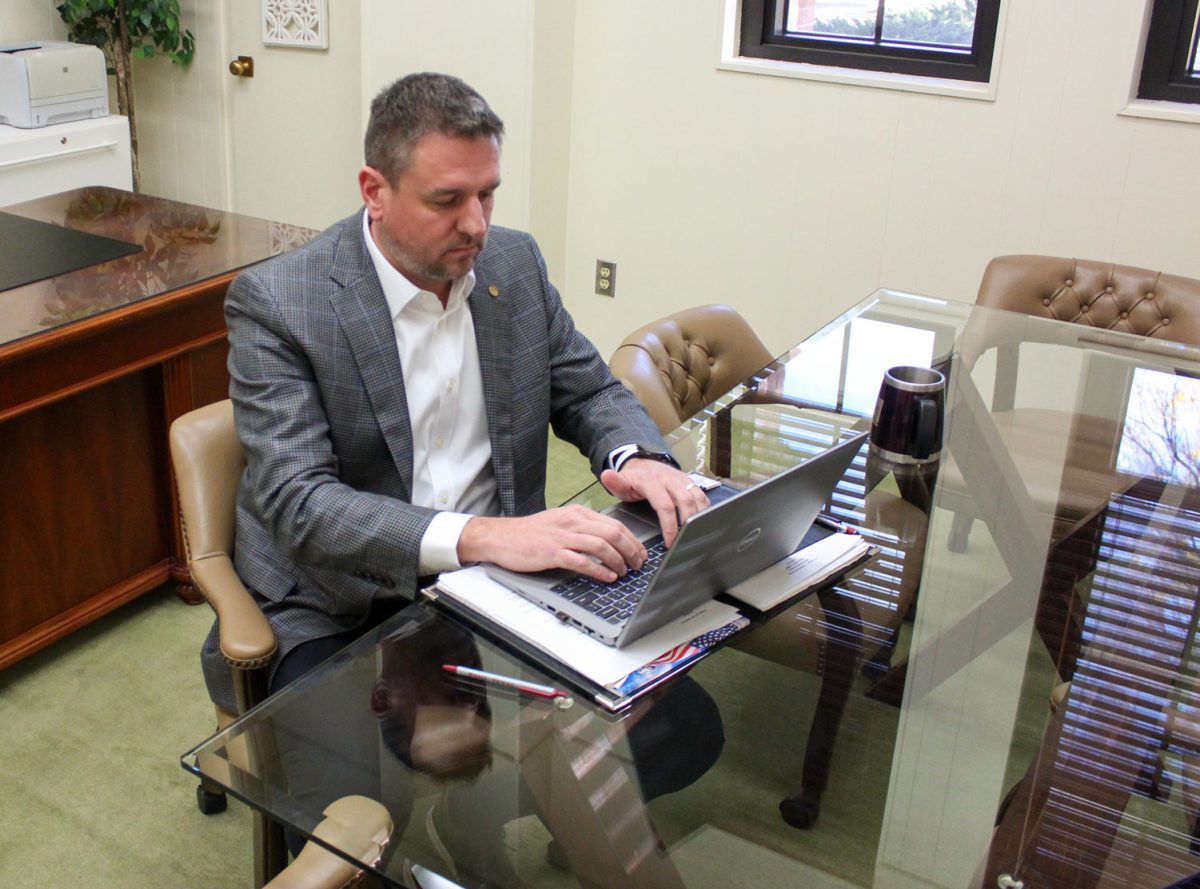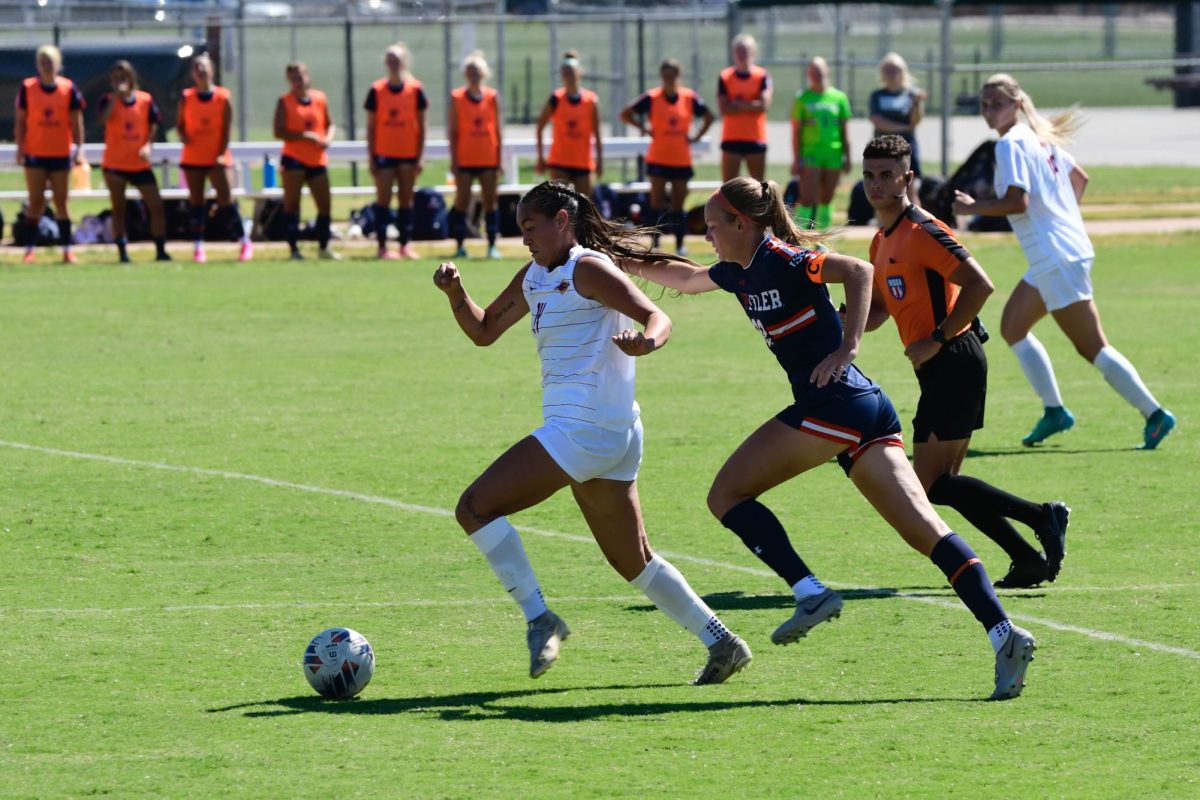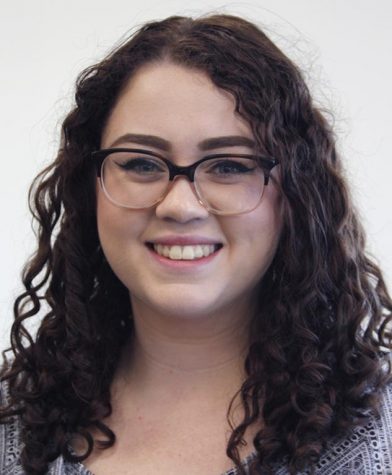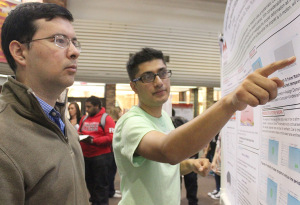
Sept. 26, 1905. Albert Einstein’s special theory of relativity (or E=mc2) is published after more than seven years of research, introducing new ideas to mechanics close to the speed of light. “If we knew what we were doing, it would not be called research, would it?”
Nov. 19, 2015. EURECA, Enhancing Undergraduate Research Endeavors and Creative Activities, and UGROW, Undergraduate Research Opportunities Summer Workshop, hosted the Undergraduate Research and Creative Activity Forum with 49 presentations and more than 100 presenters. More than 100 years after what is arguably the world’s most famous equation was published, the value of research has not changed, even in the small town of Wichita Falls.
“As you collect data, more questions come up and we have to select what we do first and go in a logical order. Many of the presentations were not just new pieces of information to the students, but to the disciplines,” Magaly Rincón-Zachary, director of undergraduate research, said. “That’s what research is.”
At least 400 students checked into the forum, located in the Atrium of Clark Student Center. Various professors offered extra credit for attending and evaluating three presentations.
“There are almost 6,000 students at MSU, but only 400 came to the forum and about 140 presented. Where are the others?” Rincón-Zachary said. “It was a great turnout all around, but big picture wise, it just seems like a small number.”
Rincón-Zachary adjusted her small-framed glasses on the bridge of her nose, gazing at the books that line her office shelves as she discussed the gradual increase of presentations per semester.
“The forum occurs once per semester, and it gets bigger each time,” Rincón-Zachary said. “We have to work fast to find space for the spring forum, which is always historically larger than fall.”
This past spring, 53 posters had to be squeezed into the Atrium, along with 17 oral presentations in both Comanche Suites and Kiowa. Compared to this fall’s 24 posters and 25 oral presentations, the Atrium was not even remotely as packed as it was in the spring, according to Rincón-Zachary.
“The spring forum had over double the amount of poster presentations, so imagine how much tighter the fit was,” Rincón-Zachary said. “There will be a time where the Atrium is not enough.”
Pre-med freshman Brittni Coss, who attended the event, tucked a strand of her bleached-blonde hair behind her ear and lightly chuckled when asked about the space for the forum.
“It was like weaving through a maze the entire time. I have never seen the Atrium so packed before,” Coss said. “You were bound to run into someone, literally.”
The side of the Atrium that holds the Cheyenne room and Wichita I & II room remained full of chairs, couches, and curious students while the forum continued on next door because administrators were afraid the furniture would be damaged during the move.
“I think of my furniture at home that isn’t on rollers either, and I move it every week because I have to clean behind it and all of that. But I guess it’s a different philosophy. I hope that changes,” Rincón-Zachary said. “Is furniture more important than a scholarly activity?”
Other location options have been considered for the spring 2016 forum in April. Rincón-Zachary shuffles some papers on her desk and folds her hands in her lap while discussing the growth of the forum.
“We may have to move to the Coliseum, but the concern is that a lot of traffic comes to the forum because it’s in the Student Center. Students will end up stopping by, even if it’s just on a walk to class,” Rincón-Zachary said. “If we move, students, faculty, and staff will have to make more of an effort to walk to the Coliseum, versus the Student Center which is in the heart of campus. It’s both a drawback and an advantage.”
She smiles and nods her head while discussing the forum’s success, following the relief she had after it was all over.
“It was absolutely great, every semester just gets better and better. The student enthusiasm was contagious; it created an energy in the Atrium,” Rincón-Zachary said. “After it was over, I had what seemed like an adrenaline crash over the weekend. Once you put in all that hard work and then just like that it’s over, you can finally relax.”
Accounting sophomore Aubrey Kass has been working on her poster with partner Adam Likeness since August. Their poster, titled “Turning up the heat on volunteer motivation: A study examining what makes America’s most famous triple digit weather bike race so attractive for its’ volunteers,” won best poster from the Dillard College of Business Administration.
“It was an amazing experience being a part of the forum. I gained a value for research that I didn’t have before, and that’s really the whole point,” Kass said. “Winning the best poster for the Dillard College of Business was an amazing achievement and really made all the hard work and numerous hours of time worth it. It was a huge honor.”
Rincón-Zachary sat quietly in her chair, thinking, before discussing changes for upcoming years.
“It’s hard to say what should be changed when the forum itself was a huge success in my eyes. The main issues were really just space and number of volunteers,” Rincón-Zachary said. “I plan to reach out to different organizations on campus for more volunteer help and to improve communication about attending the forum in general.”
Coss leaned forward and clapped her hands in front of her chest when she explained her experience at the forum and why students should go.
“It was really cool to see my peers evaluating posters seriously versus taking it as a joke or only doing it for extra credit. It made me put more thought into my evaluations and ask more questions to the presenters,” Coss said. “The amount of professionalism in the room is something every student should see. It showed me the true value of research and that if I wanted to start my own project, this university grants me easy access to that opportunity.”
Quote collection
Attendees
- Destiny Zynda, exercise physiology senior | “I attended for extra credit honestly, but while being here it has taught me a lot. I think it was worth it because I learned about different things that I usually wouldn’t learn in class.”
- Eric Olson, sports administration graduate assistant | “I figured it would help out. I really only did this for extra credit, but it is interesting to see people’s presentations and the creative process behind them, but mostly for the extra credit. I learned a lot about certain students going above and beyond to inform other students, and faculty about certain issues or advancements.”
- Caleb Acuna, mechanical engineering sophomore | “I came today to see how students approached topics that they were interested in. It’s very interesting to see how they research and develop new machines to help society grow. I am very excited to join this group in the future.”
- Brady Burross, mechanical engineering sophomore | “I came to support my friends in mechanical engineering who made the hot weather ballon and the spider robot, but there is a lot to learn, especially if you’re really into science and there are a lot of new ideas.”
- Mary Brady, education senior | “I did a EURECA project a couple semesters ago and I just like to see what they’ve come up with this semester, just to see the new research that they’re doing, and also to get extra credit. I learned several things from just the three posters that I judged. I learned that math games helped a students with a disability, it increased their fluency percentage.”
- Sydney Bateman, nursing freshman | “I came to learn about stress management and to get the extra credit because college is hard, and I need to learn how to control my stress and prioritize things better.”
- Derrick Hackett, psychology sophomore | “It was worth attending just to see different outlooks on research, I never really pay attention to other majors and what they research, so to see what goes on was pretty interesting.”
- Sumaita Alam, nursing freshman | “Anything to get extra credit is a good idea, so yeah, coming here is worth it.”
- Nanette Philip, mechanical engineering senior | “I attended the undergraduate forum for extra credit for some of my classes, but also to support my friends who are presenting. It is good to get outside of your major and observe what other students are studying. It is worth attending because I have gotten a lot of good information from the presenters.”
- Quade Coward, exercise physiology junior | “At first I attended because it was extra credit for one of my classes. I just had to summarize two posters and I was done, but once I started reading the posters I realized how interesting it was so I stayed longer to read others.”
- Lauren West, psychology junior | “Though it was for extra credit for my race and ethnicity class, I have learned a lot from the posters and they are really neat.”
- Kiawa Chambers, respiratory therapy junior | “It was very interesting and informative. I attended to learn more about what our undergraduates are learning.”
- Malaeni Ramos, physiology sophomore | “I had to come for extra credit for my anatomy class. I’m finding out interesting stuff plus I get extra points.”
- Taylor Whiteside, nursing sophomore | “I came for extra credit for microbiology. It was worth coming to, I got to look around and see all the research that’s been done and I got extra credit.”
- Sierra Scannel, undecided freshman | “My morning class ended early so I decided to check out the presentations in the atrium. The presentations were a bit overwhelming at first because there were all these words I didn’t know, but I go to talk to the presenter about what else they do within their major to see if that was something that appealed to me.”
- Cameron Cahayla, biology sophomore | “I was told that a couple of my classmates did research on bacteria in seeds and how to isolate melatonin. So I came to read up on their progress and how it all works.”
- Jordan Hall, radiology freshman | “I came on my own because I thought it would be interesting. I’ve learned a lot I would think would take longer or would take more research.”
Participants
- Kendall Stewart, respiratory care senior | “We did this research for the TSRC, Texas Society for Respiratory Care, in Houston in July, and then we entered in this event here. We researched E-Cigs and apes to learn more about the effects and explore more about them because they are a newer product. We interviewed people who used E-cigs. The majority used them to stop smoking cigarettes. More research is still in progress, and we will do another study again in a few years to see more of the effects and learn more about the chemicals in E-cigs and apes and what is in the juice in it.”
- Magen Brown, geoscience and psychology senior | “I chose to participate because there is a vast amount of knowledge that we overall don’t have. To be able to find out and understand what’s going on around the Earth is fascinating.”
- Aubrey Kaas, accounting sophomore | “One of my professors randomly asked me to participate. It’s an honor to be asked to do undergrad research with one of your professors. It helps when trying to get into grad school as well, it was an interesting topic for me as well.”
- Seth Witherspoon, mechanical engineering junior | “I love the idea of the research of EURECA. Being able to actually use my knowledge and grow is a priority of mine. There are different ways that you can make engines more practical and clean.”
- Alicia Ward, english senior | “I was invited by Dr. Lodge to do a EURECA project for a new translation she’s working on. This is my first time presenting and I think EURECA is better for science related fields.”
- Sean Egloff, engineering senior | “Firstly it’s all part of the EURECA mentorship/funding program. It is a great way to learn and get your project running. By participating and approaching your idea you are able to do more research as the program raises funds for you, which individually you wouldn’t be able to achieve.”
- Katy Miser, social work junior | “It was an assignment for my social work class. I is a research class and everyone that takes it must do the assignment. I was able to learn the different stress management skills by gathering research through surveys.”
- Gerald Sampson, nursing senior | “I wanted to do something I wanted to do, not just something that was complex. It was worth it. I learned something new about how basketball was created and the founder.”
- Alicia Ward, english senior | “I was invited to help out with presenting this poster. It was also a good opportunity and it will look good on resumes in the future.”
- Challena Pinckney, environmental science senior | “I participated because this will look great on my resume´as well as help build a social network for me in the future. The experience earned from this opportunity and the recognition meant the most to me.”
- Kayla Fells, special education senior | “I was tired of seeing children able to comprehend how to play a video game, but not comprehend simple math facts or problem solving. So I did my research on statistics showing how quickly children can adapt to educational gaming technology.”
- Qianying He, biology junior | “We were introduced to a prior study by our mentor, James Masuoka.”
- Carly Smith, respiratory senior | “We presented this at the Texas Society for Respiratory care and we think it’s a really cool topic to teach about because many people don’t know about it and we want to spread awareness.”
- Kayla Fells, special education senior | “I choose to participate because it’s always been my dream to do EURECA. I like to learn, and being in charge of my own learning is the most rewarding experience for me. Ever since I was a kid, I liked creating things. There were times at which I would just grab stuff and start tinkering with it. I used to take things apart, figure out how they worked, and put them back together again. That’s just who I am, I never really liked sitting in a classroom and just looking, but if I was ale to explore, I loved it. And as much as I want to say I taught the participant, the participant taught me. There were a lot of things in which I could go to my mentor and ask him things on what I should do, but there were times in which I had to maker the call quickly. You have to be flexible at a split second, and you can’t think about a decision, you’ve got to make it right then and there and hope that’s the right one. You’ve basically got to go with your gut.”
- Sean Egloff, mechanical engineering sophomore | “I have always been fascinated with engineering. I’ve learned so much through this program. It really reignited my passion for building machines and accomplishing goals when I started school after being in the Air Force.”
- Kayla Ferris, special education senior | “I found it really sad that students who don’t do well in science, math, and English know the buttons on Guitar Hero and Halo like the back of their hands. To me there’s something wrong, because I find it sad that students just find school boring. I have a new respect for those who research. Their job is not easy. What they teach you in high school about research is not research.”
Undergrad Fall 2015
![Ariel Grantom, pre vet senior, turns in her extra credit for the Undergraduate Research and Creative Activity Forum, held in the CSC Atrium, Nov. 19. "[I'm here because of] all the interesting posters and all the extra credit for classes, but pretty much the extra credit," Grantom said. Photo by Rachel Johnson](https://thewichitan.com/wp-content/flagallery/undergrad-fall-2015/webview/eureca1_web.jpg)

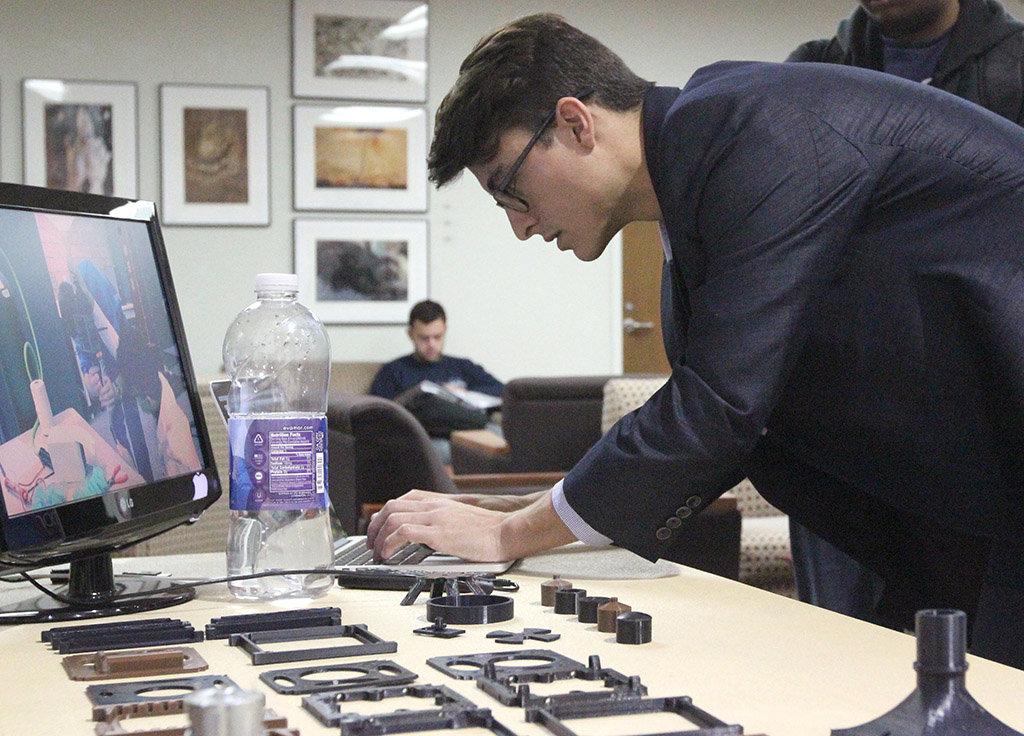
![Kyle Walsh, radiology freshman, and Diana Perez, radiology freshman, read the posters at the Undergraduate Research and Creative Activity Forum to fill out their extra credit for class, held in the CSC Atrium, Nov. 19. "[I'm here because] it was extra credit for my anatomy class. [So far] I really like the faith based rehab for addicts because my dads an alcoholic and going through a program right now so it kind of hits home," Walsh said. Photo by Rachel Johnson](https://thewichitan.com/wp-content/flagallery/undergrad-fall-2015/webview/eureca4_web.jpg)









